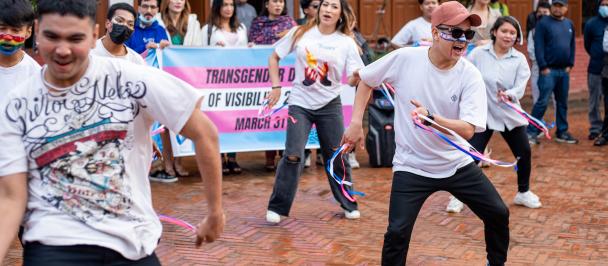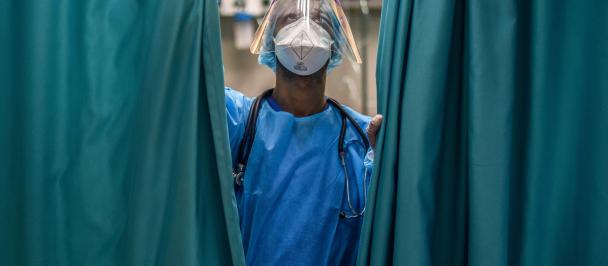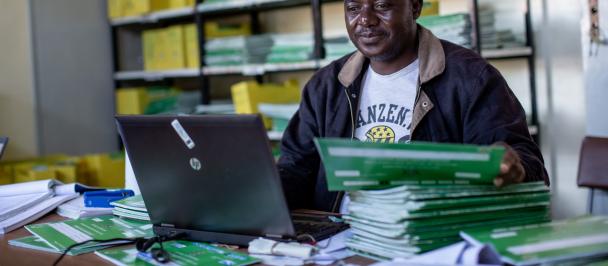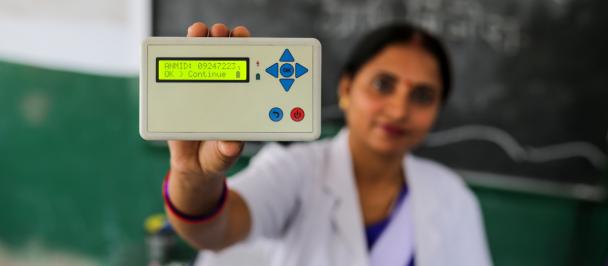Six years ago, 193 countries committed to reduce inequalities, including a target to ensure equal opportunity by eliminating discriminatory laws, policies, and practices as part of the sustainable development goals and the pledge to leave no one behind.
Despite this pledge, the effects of widespread discrimination continue to play out in real time, harming people’s health and human development. COVID-19 is exposing and deepening existing inequalities, and disproportionately impacting marginalized and vulnerable communities that are, too often, left without access to critical tools and services. Unless this changes, the world will not be free of COVID-19 and its devastating consequences. Put simply, this pandemic won’t be over anywhere until it’s over everywhere.
Countries with weak systems for health are being left behind
The fact that vaccines are being rolled out a year after the virus first emerged is a scientific triumph, but the very nature of this rollout reveals stark inequities. One hundred and twenty nine nations have yet to receive a single COVID-19 vaccine dose, and poorer countries will only be able to vaccinate 3 percent of their populations through Covax by the end of the first half of 2021. According to current projections, Africa and Latin America will likely be unable to achieve widespread vaccination before 2023 or 2024.
Delaying access to vaccines will have serious health and development consequences for low and middle income countries (LMICs). Twenty one countries in Africa now have case fatality rates that are higher than the global average, and that’s often due to overstretched and under-resourced systems for health. As the director of the Africa Centres for Disease Control and Prevention, John Nkengasong, puts it: “People are dying because of a lack of basic care.” Other, entrenched public health issues threaten to compound the situation: just as the west Africa region works to fend off a second wave of COVID-19, Guinea has now officially declared that it’s also dealing with a new Ebola outbreak that has already claimed five lives.
Similarly, the pandemic has set the global AIDS response back even further. As just one example, the scale-up of HIV treatment was 50 percent lower in the first of 2020 than in the first half of 2019.
These inequities impact us all. Unequal vaccine distribution could allow the pandemic to spread relatively unchecked in resource poor countries that must contend with multiple, overlapping crises, slowing overall global economic recovery and prolonging the pandemic.
We have seen before how inequalities prolong crises
Inequalities, fuelled by stigma and discrimination, have for decades obstructed proven solutions in HIV prevention and treatment. For example, at least 92 countries still criminalize HIV transmission, exposure, or nondisclosure, and at least 68 countries and territories criminalize consensual same-sex sexual relations, exacerbating stigma in such a way that hinders key populations’ access to prevention and care. Research shows that punitive laws and discriminatory policies fuel HIV transmission among key populations, which includes people living with HIV, gay men and other men who have sex with men, sex workers, transgender people, people who use drugs, and people in prisons and other closed settings.
The pandemic and accompanying response measures are also compounding inequities for marginalized groups, particularly in LMICs, disrupting access to HIV and other services and threatening decades of progress. Women and key populations, for example, are reporting an elevated risk of domestic and family violence, increased social isolation, and difficulties accessing HIV and health services.
Typically, marginalized communities in high income nations have not been spared either: a new report from the US Centers for Disease Contol and Prevention confirms that gay, lesbian, and bisexual people experience stigma and discrimination in their lives that “can increase vulnerabilities to illness and limit the means to achieving optimal health and well-being,” leading to higher COVID-19 risks overall.
We need global solidarity to support strong systems for health, for everyone
Ensuring that discriminatory laws, policies, and practices and inequalities do not hinder life saving tools from reaching all who need them requires strong systems for health and inclusive governance built on trust. As with HIV, COVID-19 responses should be grounded in data, evidence, and human rights, and communities are central to ensure people have continued access to the services they need to survive.
That is why in July 2020 the United Nations Development Programme (UNDP), World Health Organization, UNAIDS, and the O’Neill Institute launched the COVID-19 Law Lab to support evidence and rights based legal frameworks for COVID-19 responses. It is also why UNDP and The Global Fund work with community led organizations, such as those in Panama, to ensure marginalized groups have access to HIV services during COVID-19.
But there is still much more to be done—we need to walk the talk on global solidarity to prevent millions more deaths. It is critical that countries increase funding and support for international cooperation. We must marshal the full strength and capacity of the multilateral system to deliver equity—now.
On this Zero Discrimination Day, all countries must bring the pledge to leave no none behind to life by investing in strong systems grounded in data and equity to help those most in need, and to help end this pandemic for everyone, everywhere.
This article was originally published here.

 Locations
Locations




